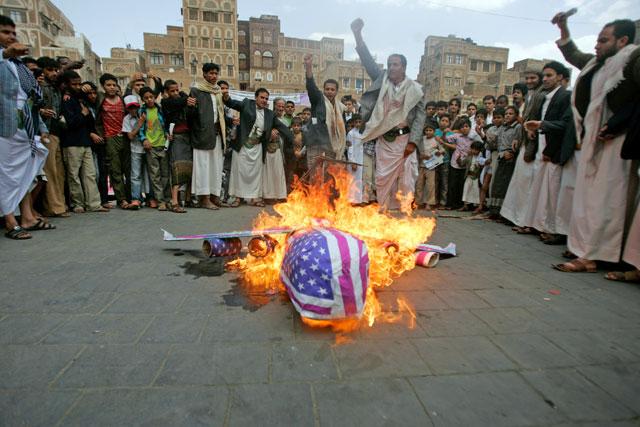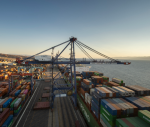You are here
Trump risks deeper entanglement in Yemen’s murky war
By Reuters - Feb 07,2017 - Last updated at Feb 07,2017

Protesters loyal to the Shiite Al Houthi rebel group burn an effigy of a US aircraft during a demonstration to protest against what they say is US interference in Yemen, including drone strikes, after their weekly Friday prayers in the old Sanaa city on April 12, 2013 (Reuters photo)
DUBAI — Yemen is emerging as a test ground for US President Donald Trump’s forceful approach to Al Qaeda and Iran, but his first actions there risk drawing his administration further into its convoluted two-year-old war.
A US raid last month killed several Al Qaeda militants, but also left a Navy SEAL and several civilians dead, while the deployment of a destroyer to patrol the Red Sea coast drew the ire of Yemen’s Houthi movement, an ally of Iran.
The flurry of operations since Trump took power on January 20 included three drone strikes on suspected Al Qaeda militants and increased logistical support for a Saudi-led campaign against the Houthis that began under his predecessor Barack Obama.
Washington has long supported the exiled Yemeni government against its Houthi and Al Qaeda foes, who are also fighting each other. But Trump’s more muscular approach may have unintended consequences, analysts and Yemeni officials warn, reversing efforts by Obama to achieve a peace deal and firing up two organisations hostile to US interests.
“Rather than advancing a political solution that almost everyone agrees is the only way to solve the conflict, it seems the Trump administration’s actions are just adding fuel to the fire,” said Adam Baron, a Yemen expert at the European Council on Foreign relation.
Reacting to the Navy SEAL raid, a Yemeni tribal leader said: “If they had just bombed the place it would have been much easier and less risky, but it looks like Trump is trying to say ‘I’m a man of action’.”
“It looks like the new president has watched a lot of Steven Seagal movies,” he added, referring to the action film star.
‘Proxy terrorist’
Seizing the capital Sanaa, the Houthis drove out the internationally recognised government in 2015 and now control most population centres in the largely desert and mountainous country at the tip of the Arabian Peninsula.
The Shiite Islamist movement, which denies receiving any military aid from Iran, portrays Washington as an aggressor in the war that has killed over 10,000 people and unleashed mass hunger and disease.
The latest US actions risk fuelling that narrative.
After the Houthis attacked a Saudi frigate off the Red Sea coast last week, US officials said the destroyer USS Cole — the same vessel that was attacked by Al Qaeda off Yemen in 2000, with the loss of 17 sailors — had arrived at the nearby Bab Al Mandab Strait to protect international waterways.
Trump’s new national security adviser Michael Flynn then accused the Houthis of being one of Iran’s “proxy terrorist groups” — a label the last administration and even Saudi Arabia had avoided in hopes of reviving stalled Yemeni peace talks.
Ahmed Hamed, information minister for the pro-Houthi authorities in Sanaa, fired back that the deployment was part of an Israeli-American plot to weaken Yemen’s patriotic resistance and empower militant groups.
“America and Israel are seeking to enable Al Qaeda and the Daesh terror group in the Bab Al Mandab,” he said, dismissing what he called a “public relations tempest about Iranian meddling”.
While former secretary of state John Kerry repeatedly visited the Gulf to try to seal an elusive deal between the Houthis and their government foes, the lack of any explicit commitment by Trump to those efforts could bode ill.
“The Iranians would love to see the Americans caught in a quagmire in Yemen, and vague talk of imposing red lines — in this case on Iranian behaviour — may not end well,” said Baron.
‘He fought the houthis’
Pro-government forces backed by Saudi Arabia are fighting Houthi loyalists in battlefronts stretching throughout Yemen and across its knotted array of armed tribal and militant groups.
It was into this explosive environment that US Navy SEALs rappelled on a moonless night on January 29, engaging in a firefight that killed several suspected Al Qaeda militants in a southern village.
By daylight, one of the commandos had been killed and local medics said women and children were among some 30 dead Yemenis, allegations the United States said it was investigating.
Though Al Qaeda claimed one of the dead, Abdulraoof Al Dhahab, as one of their “martyrs”, some officials on the government side denied that and said he was an important partner with local tribes in battles against the Houthis.
“Trump must have launched the raid without enough information — Abdulraoof was a good, honest man, not with Al Qaeda. He fought the Houthis,” a local tribal leader and security official told Reuters.
Some see a risk that the armed incursion could alienate local opinion and even encourage Al Qaeda recruitment.
“The raid ignores the local political context, to the detriment of an effective counterterrorism strategy,” April Longley Alley of the International Crisis Group wrote in a report last week.
Such commando actions risk bolstering Al Qaeda’s “narrative of the need to violently oppose what they claim is a US war against Muslims”, she warned.
Related Articles
The Yemeni government has expressed concern to the United States over a US commando raid targeting Al Qaeda militants which killed several c
WASHINGTON — When US Defence Secretary Jim Mattis greeted Saudi Arabia’s foreign minister at the Pentagon last month, the first thing he did
ADEN — Suspected Al Qaeda militants in southern Yemen killed six policemen Thursday and their extremist group was targeted in a raid likely
















